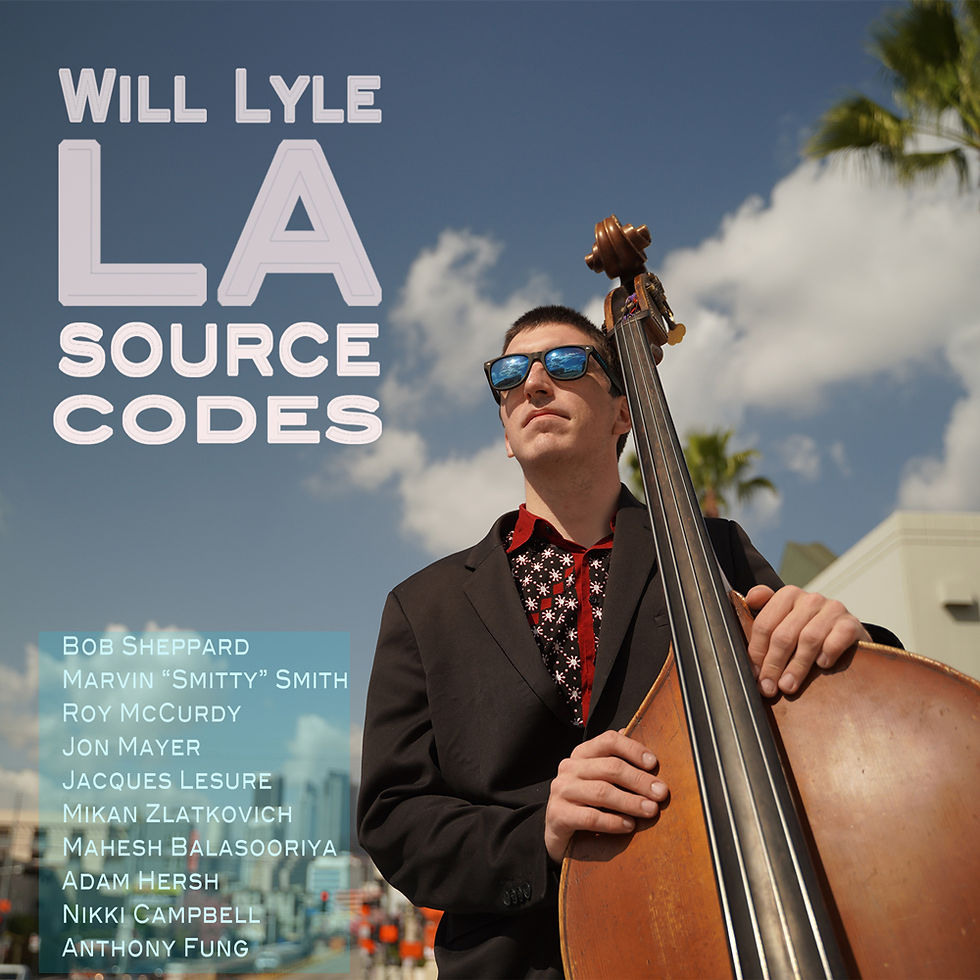Listening edge of my seat intently to L.A. Source Codes, multi-talented young Los Angeles bassist Will Lyle’s eclectic and effusive hard swinging yet eminently sensual and sometimes exotic debut album, a quote from Ted Gioia’s landmark 1998 book The History of Jazz came to mind. Discussing styles that emanate from specific times and places, he wrote: “Like the New Orleans tradition that preceded it, and the Swing Era offerings that followed it, Chicago jazz was not just the music of a time and place, but also a timeless style of performance – and for its exponents, very much a way of life.”

Considering the Berklee educated Lyle’s expansive resume over the past few years, it was perhaps only a matter of time before he found a unique way to bridge past and present in creating an epic, sweeping 12 track romp that rolls from the bustling Brazilian baio and Partido alto groove and and distinct Cedar Walton influenced “Forasteira” through the spirited and sparkling piano-centric whirlwind through “You Stepped Out of a Dream.”
After graduating from Berklee, he toured with Grammy winning drummer Billy Kilson’s quartet in Japan, then became a member of hard bop pianist Jon Mayer’s trio. Lyle’s also ensembled with the late Ralph Peterson and countless greats in his home region of SoCal, including blues singer Barbara Morrison and two of the storied vets, tenor saxman Bob Sheppard and drummer Marvin “Smitty” Smith that help him bring his set of four originals and colorful re-imaginings of eight classics to life.
For an emerging artist, the typical, sure-fire way to create a stellar opening project is stick with one’s core group and add a little musical fairy dust via guest spots for renowned names that can help elicit wider interest and add seasoned punch to the sessions. Lyle delightfully defies this conventional wisdom with a much more adventurous concept – joining forces with three generations of musicians via three distinct ensembles as a way of manifesting the bassist’s belief that bebop, traditional and Latin jazz are the musical “source codes” kept alive by the dynamic creativity and flow from the older generation to the younger than he now entrusts himself with.
Because of the exuberant, freewheeling joys and sensual soulful nuances infusing every track no matter who is taking the lead melody or solo, the casual listener may not need to have Lyle’s specific groups so delineated. Others, however, may want to know that versatile veterans Jon Mayer (piano) and Roy McCurdy (drums) create a splendid trio with the bassist for a bright, optimistic stroll through “Be My Love” and a more subtle, moody and impressionistic take on Henry Mancini’s “Two for the Road.”
Lyle’s quartet with of Sheppard, Smith and pianist Mahesh Balasooriya tackles the hard swinging, polyrhythmic and intensely percussive explosions of the aforementioned “Forasteira” (one of Lyle’s grand originals), a bustling (and nonstop solo filled) run through Cole Porter’s “So In Love” (inspired by Cedar Walton’s big band arrangement), the whimsical strutting vibe of Grant Green’s sometimes shaded blues inflected “No. 1 Green Street” and another hop, skip and jumper, Frank Loesser’s “I Believe in You” – a long time favorite of Will’s from a classic Sinatra/Basie recording.
The third team is a trio with pianist Adam Hersh and drummer Anthony Fung, who bring Lyle’s three other originals to life – including the brisk, hypnotic “Above the Clouds,” the murky and dark-tinged reflection “rains_of_change” (a somewhat chaotic, unpredictable piece only a year like 2020 could have inspired), the vibrant and infectious Latin spiced jazz dance “La Cumbia de MacArthur Park” and a classic styled, hi-hat and melodic piano focused trad jazz arrangement of “You Stepped Out of a Dream.” If the brilliant and innovative Lyle is the future of jazz, the previous generations can rest easy that they’ve passed the baton to the right cat.






Comments